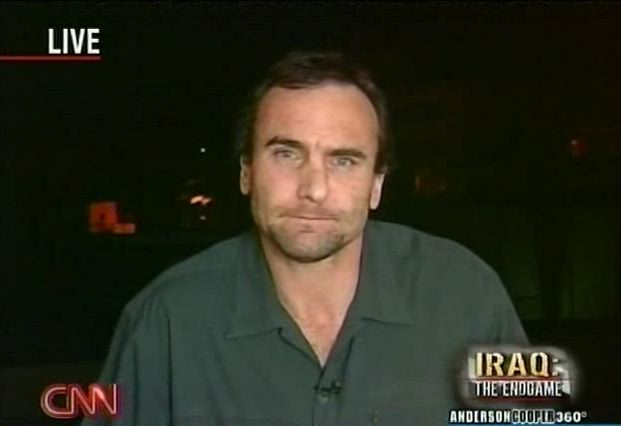AC: "This is the war that you have, and it needs to be fought..."

Click photo to play
Length: 4:37
JOHN ROBERTS: We should say that Michael Ware is joining us now live from our Baghdad bureau.
Michael Ware, I know that you're coming into this just a little bit late, but, just to set you up here, this idea that troops could be out by September of 2008, if the House of Representatives, the Democrats, at least, were to have their way, U.S. troops, of course, could pull out any time they wanted. But, if there is a timetable set to pull out by a date certain, September 2008, what do you think would happen there?
MICHAEL WARE, CNN CORRESPONDENT: Well, that just gives America's enemies opportunities to strategically poise themselves for that moment.
It also allows America's enemies to use that moment as a block or a wedge, against which they can pressure America politically and indeed militarily. This just feeds those who are opposing the U.S. mission. Whether you were for this war or against this war, whether -- from the beginning, whether you want the troops home or not, it doesn't matter anymore.
This is the war that you have, and it needs to be fought, and it needs to be fought properly and to the end. And, by putting these unrealistic artificial caps of any kind on them, you are only playing to your opponents.
ROBERTS: As we speak, Michael, there is some sort of evolution among the Mahdi militia, as I understand it, that they're breaking away into far more splinter groups than they had in the past. There's some question whether Muqtada al-Sadr even has control over many of the elements formerly of the Mahdi militia.
If he doesn't have any control over them, and U.S. forces were to pull out, what could be the possible result of that?
WARE: Well, someone else scoops them up.
And apart from the anarchy that would ensue, what we would see is that, from the turmoil -- be it political or be it on the streets fighting, sort of what we're seeing underneath the surface now -- you would see others moving into the gap to consolidate their power.
So, primarily, we're seeing some of the most powerful Shia blocs outside of Muqtada right now doing just that, consulting their power. So, all sorts of tempests would be unleashed if the U.S. forces left, from al Qaeda on the Sunni side, to the most hard-line Shia militias, backed by Iran's best Quds Force special operatives.
ROBERTS: Kathleen Hicks, all this talk about deadlines, the fight between the White House and Congress, what kind of an effect is that having on the military?
HICKS: I think the military expects the fight that they're seeing now.
And I think that, at all ranks of the military, you're seeing a great disenchantment with the political process in Washington, with the laying at the feet of the military the political strategy for winning Iraq. The only voice I have heard in the last month out of Iraq on the U.S. side is General Petraeus. And he's responsible for the military portion of the strategy in Iraq.
And we seem to have lost that distinction between the political ends that we're seeking and the military means that are but one piece of that strategy.
So, I think it's -- the whole situation is disheartening. But I'm not sure that the actual disagreements between the White House and the Congress are to blame for that.
ROBERTS: Michael Ware, I talked with Senator Joe Lieberman earlier, a former Democrat, now independent, caucuses with the Democrats. He's opposed to this whole idea of setting deadlines, saying it looks like there's a little bit of progress on the ground, and to start talking now about taking troops out is just the wrong thing to do.
Is he correct? Is the surge working?
WARE: Well, American generals themselves will say it's far, far too early to tell. You're talking about one or a little over one month or more into an operation that's going to take six months, perhaps nine months, 12 months. So, it's too early to tell.
Yes, we have seen some positive signs. The number of sectarian murders, the number of executed bodies showing up on the streets of the capital each morning are down. There were still 33 the other day, but they're down. You can't read too much more into that, particularly when you're seeing violence displaced to other areas, like Diyala Province to the north, and when militia and Sunni insurgent leaders, we know are laying low, sitting back, and seeing where the new strategy takes them.
ROBERTS: Well, as we said at the top of this, another phase in the debate coming up, when the Senate takes up its measure next week.
Kathleen Hicks from CSIS, Michael Ware, as always, thanks very much.
HICKS: Thank you, John.
